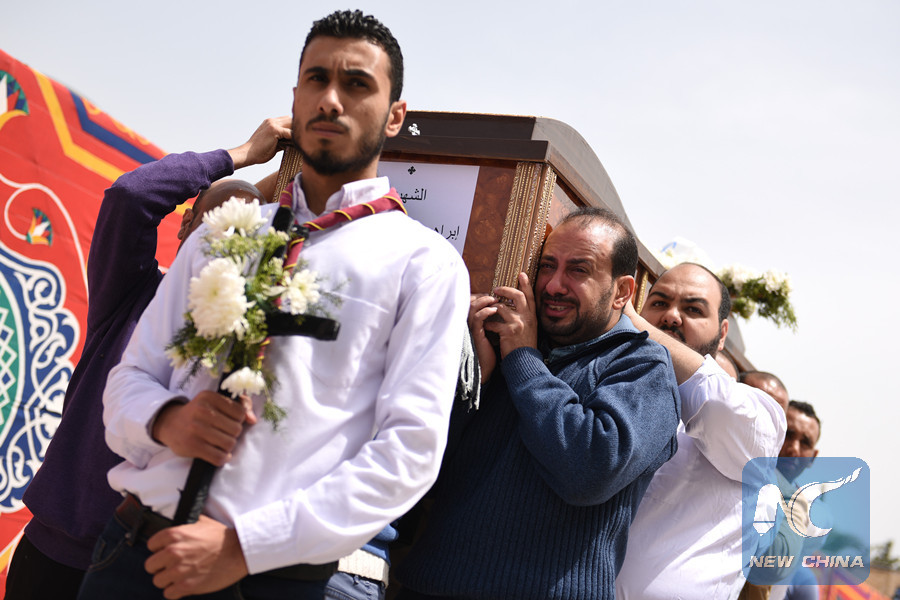
People attend the funeral of the church blast victims at St. Mina church in Alexandria, Egypt, April 10, 2017. The terrorist attacks that targeted two churches on Sunday in Gharbiya and Alexandria provinces in northern Egypt killed at least 44 and wounded over 120. (Xinhua/Zhao Dingzhe)
CAIRO, April 12 (Xinhua) -- Egypt's parliament has approved a three-month state of emergency, after twin attacks against churches Tanta and Alexandria, which killed 45 people.
The attacks coincided with Palm Sunday, one of the holiest days in the Christian calendar marking the triumphant entry of Jesus Christ into Jerusalem.
The Islamic State (IS) group claimed responsibility for the attacks, saying that two suicide bombers carried out the blasts.
President Abdel Fattah al-Sisi in a nation televised speech on Sunday ordered the army's deployment to assist police forces in securing state institutions and declared the nationwide state of emergency.
Sisi said the measure was a measure to protect the country and to prevent targeting its facilities.
Following parliamentary approval, the state of emergency is the first nationwide one since Sisi assumed office in June 2014.
A regional state of emergency has been in place since October 2014 in North Sinai, as the country launched a widescale security operation to uproot extremists who used Sinai as both a shelter and a base for attacks against security forces.
Addressing the parliament on Tuesday, Prime Minister Sherif Ismail said the state of emergency is essential in combating terrorist groups seeking to undermine the country.
"It will grant state facilities greater ability, flexibility and speed in confronting the nation's enemies who do not hesitate to kill without justification," he said.
According to Egypt's constitution and the 1958 emergency decree, the state of emergency grants Sisi the authority to use State Security Emergency Courts for a duration of three months.
"Under the current emergency law, civilians can be transferred to State Security Emergency Courts without an appeal process for State Security Emergency Court verdicts, thereby combating terrorists and bringing perpetrators to justice," said Tariq Fahmy, professor of political science at Cairo University.
The emergency law also grants rights to monitor and intercept all forms of communication and correspondence, a curfew and the closure of commercial establishments, as well as designated evacuation spaces.
In addition, the state of emergency can specify opening and closing hours of public shops or shut them down completely.
Authorities can also withdraw and confiscate weapons' permits, ammunition, flammable material and fireworks.
Sisi asserted that the state of emergency would be implemented by "necessary legal and constitutional procedures" based on Article 154 of Egypt's 2014 constitution, which states that the president must consult the Cabinet before issuing an official declaration, after which the decision must be submitted to the parliament.
Furthermore, the Supreme Constitutional Court issued a ruling in June 2013, declaring some items of the 1958 emergency law unconstitutional, a legal move limiting the president's powers during the state of emergency, according to experts.
The 2013 ruling annulled an important article of the law, which gave the president the right under a state of emergency to instruct the interior minister to conduct arrests without warrants as well as administrative detentions.
What's more, according to the 2014 constitution, parliament can now amend the emergency law which requires a two-thirds parliamentary majority to be ratified, a state which wasn't feasible during Mubarak's era.
The measure's return heightens some Egyptians' fears, who view it as a return to former president Hosni Mubarak's police state era.
At Prosecutor General Hesham Barakat's funeral, assassinated in June 2015 in a car bombing, Sisi said that "justice is shackled by the law," vowing not to wait any longer in order to amend criminal laws and the state's implementation of justice as soon as possible.
"We will not wait another five or 10 years before prosecuting those attempting to kill us," Sisi said back then.
"They are issuing orders from within their cells," referring to Islamists in prisons but whose sentences have not yet been enforced.
The Arab Network for Human Rights Information said on Monday that the state of emergency would not attain security and was intended to "further suppress freedom of opinion, expression and belief, and to crack down on human rights' defenders."
However, Megahed el-Zayat, vice chairman of the National Center for Middle East Studies believes the measure is currently essential and will give authorities increased powers to achieve security and stability.
"The state of emergency isn't targeting individuals, but seeks to track terrorists and promptly try them, bypassing the typical criminal court procedures which take much longer," he added.
"I believe the primary purpose of the state of emergency isn't to hinder citizens' rights, but only aims to minimize the time and procedures of standard trials of terrorists which could last for years," said political expert Tariq Fahmy.
He added that the nationwide state of emergency aims to confront terrorism through reactionary methods.

